Don’t be surprised to hear this being asked in certain Bangkok shopping malls, where fake phones are being sold openly and in huge numbers to shoppers prepared to take the risk of these cheap smuggled devices breaking down rather too quickly. But the DSI is on the case, reports Maxmilian Wechsler
| WHEN it comes to buying smartphones and other mobile devices in Thailand the old warning ‘Let the buyer beware’ is definitely worth heeding. Fake Apple, Nokia and Samsung products are sold in retail centers in Bangkok and throughout the country, with new copies emerging almost as soon as the genuine items are unveiled. |
According to several law enforcement sources, copies of the latest IT gadgets are being smuggled into Thailand in massive quantities, in what must be a very well-organized and profitable enterprise. While it may not be surprising that devices sold on the street at a tremendous ‘bargain’ are usually fakes, they are also sold in supposedly respectable establishments in malls and shopping centers alongside authentic products.
Information about the fakes came to light through an investigation conducted by TheBigChilli in Bangkok and surrounding provinces in recent months which involved interviews with police sources as well as visits to numerous sales points by our people impersonating customers.
Generally the vendors themselves acknowledge they are selling copies, as they are so much cheaper. When you ask to see a particular model, many sellers reply: “Do you want a genuine or a fake?” Some even offer a warranty for the fakes for a short period of time, promising to exchange the set if it breaks down. Of course, the sincerity of this promise can only be verified by making a purchase; it may often be just a gimmick to make the sale, with no intention of delivering.
The majority of sales people we spoke to said that of all the other fake products sold in Thailand, including watches, handbags, leather goods and other fashionable items, mobile IT products are at this moment enjoying the most popularity. Some law enforcement officers agree, in private.
Information about the fakes came to light through an investigation conducted by TheBigChilli in Bangkok and surrounding provinces in recent months which involved interviews with police sources as well as visits to numerous sales points by our people impersonating customers.
Generally the vendors themselves acknowledge they are selling copies, as they are so much cheaper. When you ask to see a particular model, many sellers reply: “Do you want a genuine or a fake?” Some even offer a warranty for the fakes for a short period of time, promising to exchange the set if it breaks down. Of course, the sincerity of this promise can only be verified by making a purchase; it may often be just a gimmick to make the sale, with no intention of delivering.
The majority of sales people we spoke to said that of all the other fake products sold in Thailand, including watches, handbags, leather goods and other fashionable items, mobile IT products are at this moment enjoying the most popularity. Some law enforcement officers agree, in private.
| DSI raids The Department of Special Investigation (DSI) has been cracking down on large-scale dealers and suppliers of fake mobile devices. In an operation conducted on March 11, the DSI seized 1,470 fake items labeled as Apple, Nokia or Samsung from four shops and one storage center in Bangkok’s Chinatown. “We seized the fakes from one shop and one storage point in Khlong Thom Centre, two shops at Capital Plaza and one shop in Suapa Plaza. All locations were |
raided simultaneously by a team of 20 DSI officers,” said Police Lieutenant Colonel Weerawat Dejboonpha, the director of the Special Case Operation Centre, Region 7 of DSI in Nakhon Pathom province, who commanded the operation from start to finish. The raids followed a months-long investigation, including surveillance and evidence gathering after a tip from an informant.
“We arrested Kamporn Unhavichayanon, 42, the owner of the four shops – all called T-Mobile – and the storage facility, and charged him under the Trademark Act BE 2534, Section 110 [amended by the Trademark Act (No. 2) 2543],” Pol Lt Col Weerawat said.
The suspect faces imprisonment not exceeding four years or a fine not exceeding four hundred thousand baht, or both.
Mr Kamporn confessed to all charges against him, and was released on 200,000 baht bail. He will appear in court for sentencing within a few months.
“We think the suspect has been supplying fake products to other shops in Bangkok and surrounding provinces,” said Pol Lt Col Weerawat. He added that the DSI is conducting further investigation into the background and activities of Mr Kamporn to find out where he got the fake devices.
The seizure netted copies of devices manufactured by Apple, Nokia and Samsung and included many models, including Apple’s iPhone 4S, 5S and 5C; Samsung’s Galaxy Grand, Galaxy Tab 3, Galaxy Note 3, Galaxy S4, Galaxy SIII mini, Galaxy Ace and Nokia model A1520.
A complaint on behalf of Apple and Samsung was lodged by a Thai law firm. Lawyers from the firm accompanied the DSI teams during the raids and identified the fakes. Fake Nokia products were also seized in accordance with the Trademark Act.
“Some T-Mobile shops had only a few pieces on display, with the rest of the counterfeit inventory hidden inside, under tables or even in the ceiling of one shop at Capital Plaza, but some shops showed a lot,” said Pol Lt Col Weerawat.
“They were selling the fakes for 3,000 to 4,500 baht. Tests showed that the sets were of pretty poor quality. They were working but took five to six hours to fully charge, during which time the set, charger and cable became very hot. This is one way to distinguish a fake from a genuine article, which takes about two hours to charge fully.”
Other telltale signs are that the quality and resolution of the printing on the packaging is much different when compared with the original product. In fact, even the boxes of some fake models differed in shade and brightness.
Pol Lt Col Weerawat said that the fakes were probably smuggled into Thailand in parts in the boxes, with accessories like battery, charger and earphones also inside. After arriving here the parts would be assembled, perhaps just prior to filling orders from customers.
Almost all the sellers we spoke to said their copies were made in China. A fake Samsung mobile model bore the printed words: “Made in Korea by Samsung,” while fake Nokia and Apple products said “Made in China,” where the originals of these brands are produced.
The DSI offensive didn’t go unnoticed by the sellers of fake smartphones. Every time such a raid occurs, word travels quickly through their networks and within minutes sellers remove the bogus sets displays and show only packaging. And for a while, the sellers also screen customers carefully and hide the sets in safer places, such as in their cars.
“We arrested Kamporn Unhavichayanon, 42, the owner of the four shops – all called T-Mobile – and the storage facility, and charged him under the Trademark Act BE 2534, Section 110 [amended by the Trademark Act (No. 2) 2543],” Pol Lt Col Weerawat said.
The suspect faces imprisonment not exceeding four years or a fine not exceeding four hundred thousand baht, or both.
Mr Kamporn confessed to all charges against him, and was released on 200,000 baht bail. He will appear in court for sentencing within a few months.
“We think the suspect has been supplying fake products to other shops in Bangkok and surrounding provinces,” said Pol Lt Col Weerawat. He added that the DSI is conducting further investigation into the background and activities of Mr Kamporn to find out where he got the fake devices.
The seizure netted copies of devices manufactured by Apple, Nokia and Samsung and included many models, including Apple’s iPhone 4S, 5S and 5C; Samsung’s Galaxy Grand, Galaxy Tab 3, Galaxy Note 3, Galaxy S4, Galaxy SIII mini, Galaxy Ace and Nokia model A1520.
A complaint on behalf of Apple and Samsung was lodged by a Thai law firm. Lawyers from the firm accompanied the DSI teams during the raids and identified the fakes. Fake Nokia products were also seized in accordance with the Trademark Act.
“Some T-Mobile shops had only a few pieces on display, with the rest of the counterfeit inventory hidden inside, under tables or even in the ceiling of one shop at Capital Plaza, but some shops showed a lot,” said Pol Lt Col Weerawat.
“They were selling the fakes for 3,000 to 4,500 baht. Tests showed that the sets were of pretty poor quality. They were working but took five to six hours to fully charge, during which time the set, charger and cable became very hot. This is one way to distinguish a fake from a genuine article, which takes about two hours to charge fully.”
Other telltale signs are that the quality and resolution of the printing on the packaging is much different when compared with the original product. In fact, even the boxes of some fake models differed in shade and brightness.
Pol Lt Col Weerawat said that the fakes were probably smuggled into Thailand in parts in the boxes, with accessories like battery, charger and earphones also inside. After arriving here the parts would be assembled, perhaps just prior to filling orders from customers.
Almost all the sellers we spoke to said their copies were made in China. A fake Samsung mobile model bore the printed words: “Made in Korea by Samsung,” while fake Nokia and Apple products said “Made in China,” where the originals of these brands are produced.
The DSI offensive didn’t go unnoticed by the sellers of fake smartphones. Every time such a raid occurs, word travels quickly through their networks and within minutes sellers remove the bogus sets displays and show only packaging. And for a while, the sellers also screen customers carefully and hide the sets in safer places, such as in their cars.
Fakes market survey
Not surprisingly, most buyers of fake devices are people who can’t afford the genuine articles. Many of them are impressed by the packaging and accessories like battery, charger and earphone nicely wrapped in the box. They believe the sales pitch of the clerks who will tell them “it is like the original; it will do the same job but it is much cheaper.” However, in most cases, before long they realize they may as well have thrown their money into a toilet.
Some people, especially students, buy fake smartphones to keep up with other students who (or whose parents) can afford to buy the original. Showing around an iPhone 5S on campus brings a certain amount of prestige.
One seller at a shop on the 4th floor of MBK said: “Many people, especially youngsters, ask about copied smartphones and other gadgets. I would never sell a fake as original. I also tell them that if the set has a problem not caused by the user, I will exchange it for them, within one month only.”
The seller then wrote down prices for her wares, starting at 2,900 baht for a bogus Samsung S3 mini to 4,500 baht for a copied iPhone 5S. A genuine iPhone 5S goes for around 25,000 baht. The shop displayed only a few empty boxes of originals. When a customer asked for a particular device, the woman walked quickly out of the shop and returned with it in about five minutes. She then checked the set to see if everything was working and collected the cash. She asked a higher price from foreigners.
From our observations it seems likely that all sellers of fakes at MBK get them from one location – most probably a store.
Many sellers of fake devices, especially those working out of stalls on the street and crowded shopping centers in tourist areas, display non-genuine accessories in a nice box to attract customers. When someone stops to look, usually a foreigner, the seller offers a selection of fake devices which are hidden nearby.
We counted around 14 stalls selling mobile devices on the 1st floor of Pantip Plaza, each with hundreds of boxes on display, mainly various models from Apple and Samsung. Initially, no one is obviously in charge of the stall, but if a foreigner wanders around these stalls for a short while, he or she will soon be approached by someone from a nearby stall, often a Burmese national. They will ask in good English: “Do you want original or fake?”
We observed a number of foreigners walking around these stalls examining the boxes as sellers watched them from other stalls before making their approach. When I asked one Burmese seller if the boxes themselves were genuine, he didn’t reply, but only repeated: “Mister, do you want original or fake?”
Some fakes are on display at shops on the ground floor. A Burmese seller at one shop was asking 2,990 baht for an iPhone S4. According to one Thai seller of fake and genuine devices at Pantip Plaza, in recent months Burmese sellers of fake mobiles have gotten into the business all over Bangkok. He called the sellers “an advance party to prepare for the ASEAN Economic Community (AEC) in 2015. The Burmese have already established a gang and you can imagine what it will look like after the AEC is in force. They have an advantage over Thai sellers because they can speak English and communicate better with foreigners than Thais.”
Pol Lt Col Weerawat is also worried that the establishment of the AEC will make it easier for criminals from other countries to get a foothold here. He is preparing his staff by having a foreigner teach them English.
He suggested that those who can’t afford the more expensive sets look for cheaper but well-made devices from an authorized dealer. ‘That way you get a proper warranty and you don’t lose everything if something goes wrong.”
Not surprisingly, most buyers of fake devices are people who can’t afford the genuine articles. Many of them are impressed by the packaging and accessories like battery, charger and earphone nicely wrapped in the box. They believe the sales pitch of the clerks who will tell them “it is like the original; it will do the same job but it is much cheaper.” However, in most cases, before long they realize they may as well have thrown their money into a toilet.
Some people, especially students, buy fake smartphones to keep up with other students who (or whose parents) can afford to buy the original. Showing around an iPhone 5S on campus brings a certain amount of prestige.
One seller at a shop on the 4th floor of MBK said: “Many people, especially youngsters, ask about copied smartphones and other gadgets. I would never sell a fake as original. I also tell them that if the set has a problem not caused by the user, I will exchange it for them, within one month only.”
The seller then wrote down prices for her wares, starting at 2,900 baht for a bogus Samsung S3 mini to 4,500 baht for a copied iPhone 5S. A genuine iPhone 5S goes for around 25,000 baht. The shop displayed only a few empty boxes of originals. When a customer asked for a particular device, the woman walked quickly out of the shop and returned with it in about five minutes. She then checked the set to see if everything was working and collected the cash. She asked a higher price from foreigners.
From our observations it seems likely that all sellers of fakes at MBK get them from one location – most probably a store.
Many sellers of fake devices, especially those working out of stalls on the street and crowded shopping centers in tourist areas, display non-genuine accessories in a nice box to attract customers. When someone stops to look, usually a foreigner, the seller offers a selection of fake devices which are hidden nearby.
We counted around 14 stalls selling mobile devices on the 1st floor of Pantip Plaza, each with hundreds of boxes on display, mainly various models from Apple and Samsung. Initially, no one is obviously in charge of the stall, but if a foreigner wanders around these stalls for a short while, he or she will soon be approached by someone from a nearby stall, often a Burmese national. They will ask in good English: “Do you want original or fake?”
We observed a number of foreigners walking around these stalls examining the boxes as sellers watched them from other stalls before making their approach. When I asked one Burmese seller if the boxes themselves were genuine, he didn’t reply, but only repeated: “Mister, do you want original or fake?”
Some fakes are on display at shops on the ground floor. A Burmese seller at one shop was asking 2,990 baht for an iPhone S4. According to one Thai seller of fake and genuine devices at Pantip Plaza, in recent months Burmese sellers of fake mobiles have gotten into the business all over Bangkok. He called the sellers “an advance party to prepare for the ASEAN Economic Community (AEC) in 2015. The Burmese have already established a gang and you can imagine what it will look like after the AEC is in force. They have an advantage over Thai sellers because they can speak English and communicate better with foreigners than Thais.”
Pol Lt Col Weerawat is also worried that the establishment of the AEC will make it easier for criminals from other countries to get a foothold here. He is preparing his staff by having a foreigner teach them English.
He suggested that those who can’t afford the more expensive sets look for cheaper but well-made devices from an authorized dealer. ‘That way you get a proper warranty and you don’t lose everything if something goes wrong.”
Customers learn the hard way
Ms Noi, a cook at a food court, bought a fake iPhone 5S for 4,500 baht for her daughter, who is a university student. “She was complaining that most of her friends at the university have an iPhone or Samsung smartphone and she wanted one too,” Ms Noi said.
“I can’t afford the original, so I opted for the fake because I know one seller at Imperial Samrong and she told me the copies are just as good. That’s why I bought it.
“However, from the first day my daughter noticed that the battery needed almost six hours to charge and the phone got very hot. Also, the battery lost its charge pretty fast. After eight weeks the phone wouldn’t switch on. I went back to the shop but the seller told me it wasn’t possible to repair it. It was a total waste of my money.
“The seller suggested I buy an original from the ‘black market’ on installment, which is what I did. Now my daughter is happy and so am I,” said Ms Noi.
In a similar situation, Ms Orawan bought a fake iPhone 4S for her 14-year-old daughter, a high school student who wanted to keep up with her friends.
“I bought the set for 3,500 baht from one shop at Fortune Town, but after five weeks the touchscreen was moving slowly and a few days later the set stopped working,” Ms Orawan said, adding the familiar complaints about the battery and overheating.
“The seller said that it was not possible to fix it and I should buy the newest copy – also made in China – because the quality is better. He promised to give me a special price and a one-month guarantee. But despite the great packaging and improved looks, I decided not to waste another 4,000 baht. I bought a genuine iPhone from an authorized dealer,” Ms Orawan said. Her daughter is finally happy too.
TheBigChilli also talked to an Australian resident of Bangkok who bought a copied iPhone 4S for his Thai girlfriend from a Burmese street vendor in Sukhumvit Soi 3/1. After two months the set wasn’t working properly and it was soon useless. “The telephone was always overheating while charging and it began to work slowly. I didn’t like the colour on the screen either,” the man said.
When he went back to find the man who sold it to him the stall was gone. He was told that the police had raided stalls in the area a few days before and the Burmese vendor had ran away and hadn’t returned. A man at a mobile shop nearby told him the phone had “burned down” and couldn’t be repaired.
“I lost 4,000 baht,” said the Australian, who admitted that it had been a good lesson for him, and his girlfriend. “I will never buy a fake phone again.”
One friendly saleswoman at The Mall Ngam Wong Wan admitted that fake smartphones commonly experience problems like unresponsive touchscreens and batteries that are drained in a few hours. The long charging times and the heat that is generated likely contribute to device malfunctions, as does the use of inferior materials.
Pol Lt Col Weerawat stressed that the majority of fake mobile devices are rendered useless after just weeks of use. “They are a major disappointment for the buyers. They are wasting their money and at the same time helping crooks.”
Ms Noi, a cook at a food court, bought a fake iPhone 5S for 4,500 baht for her daughter, who is a university student. “She was complaining that most of her friends at the university have an iPhone or Samsung smartphone and she wanted one too,” Ms Noi said.
“I can’t afford the original, so I opted for the fake because I know one seller at Imperial Samrong and she told me the copies are just as good. That’s why I bought it.
“However, from the first day my daughter noticed that the battery needed almost six hours to charge and the phone got very hot. Also, the battery lost its charge pretty fast. After eight weeks the phone wouldn’t switch on. I went back to the shop but the seller told me it wasn’t possible to repair it. It was a total waste of my money.
“The seller suggested I buy an original from the ‘black market’ on installment, which is what I did. Now my daughter is happy and so am I,” said Ms Noi.
In a similar situation, Ms Orawan bought a fake iPhone 4S for her 14-year-old daughter, a high school student who wanted to keep up with her friends.
“I bought the set for 3,500 baht from one shop at Fortune Town, but after five weeks the touchscreen was moving slowly and a few days later the set stopped working,” Ms Orawan said, adding the familiar complaints about the battery and overheating.
“The seller said that it was not possible to fix it and I should buy the newest copy – also made in China – because the quality is better. He promised to give me a special price and a one-month guarantee. But despite the great packaging and improved looks, I decided not to waste another 4,000 baht. I bought a genuine iPhone from an authorized dealer,” Ms Orawan said. Her daughter is finally happy too.
TheBigChilli also talked to an Australian resident of Bangkok who bought a copied iPhone 4S for his Thai girlfriend from a Burmese street vendor in Sukhumvit Soi 3/1. After two months the set wasn’t working properly and it was soon useless. “The telephone was always overheating while charging and it began to work slowly. I didn’t like the colour on the screen either,” the man said.
When he went back to find the man who sold it to him the stall was gone. He was told that the police had raided stalls in the area a few days before and the Burmese vendor had ran away and hadn’t returned. A man at a mobile shop nearby told him the phone had “burned down” and couldn’t be repaired.
“I lost 4,000 baht,” said the Australian, who admitted that it had been a good lesson for him, and his girlfriend. “I will never buy a fake phone again.”
One friendly saleswoman at The Mall Ngam Wong Wan admitted that fake smartphones commonly experience problems like unresponsive touchscreens and batteries that are drained in a few hours. The long charging times and the heat that is generated likely contribute to device malfunctions, as does the use of inferior materials.
Pol Lt Col Weerawat stressed that the majority of fake mobile devices are rendered useless after just weeks of use. “They are a major disappointment for the buyers. They are wasting their money and at the same time helping crooks.”

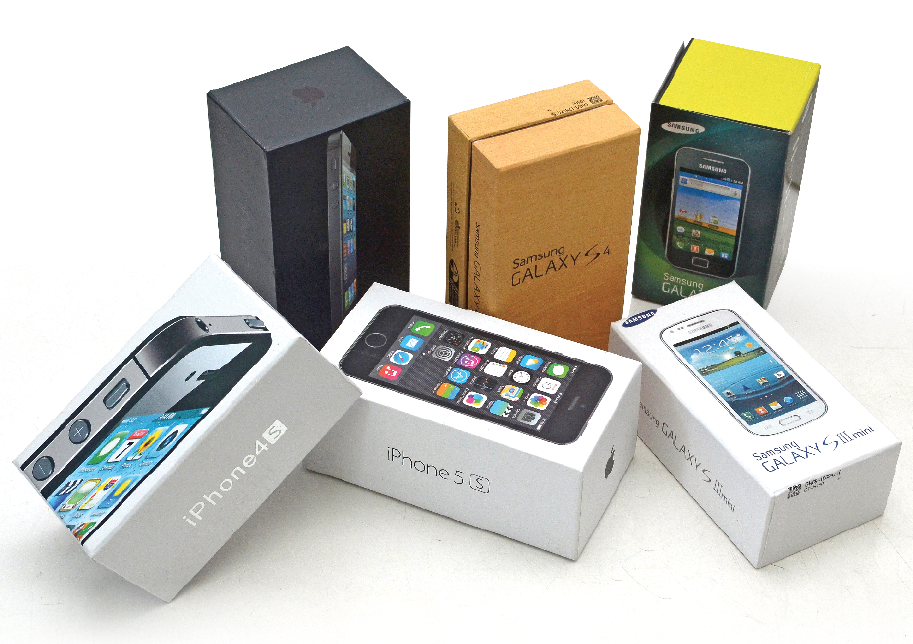
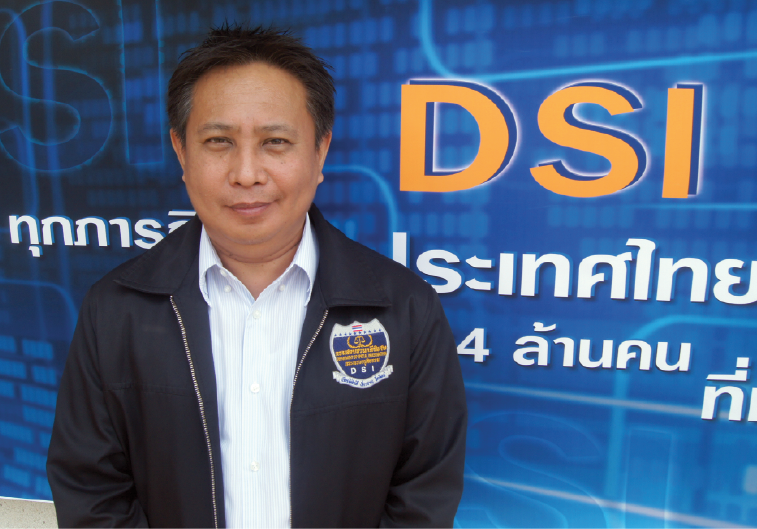
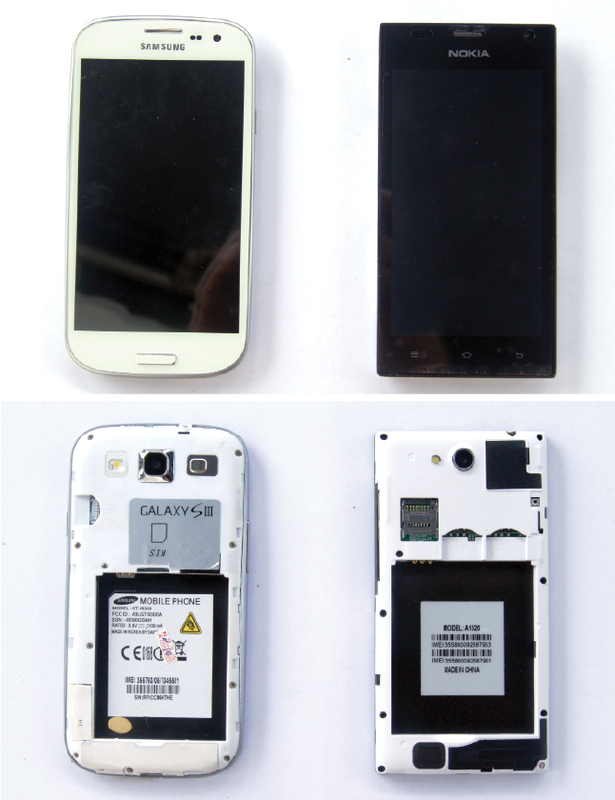
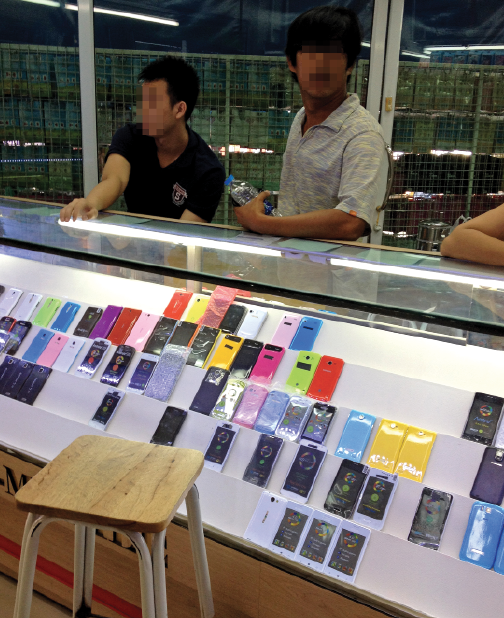
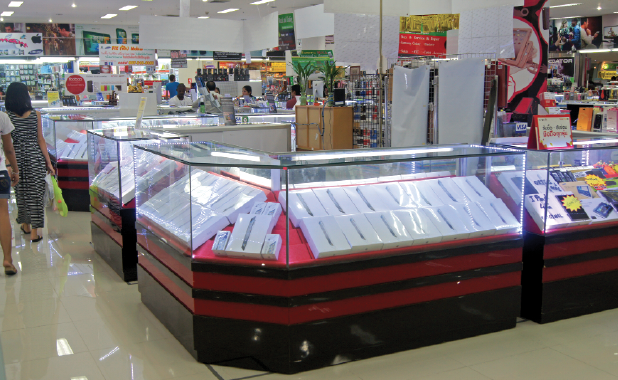
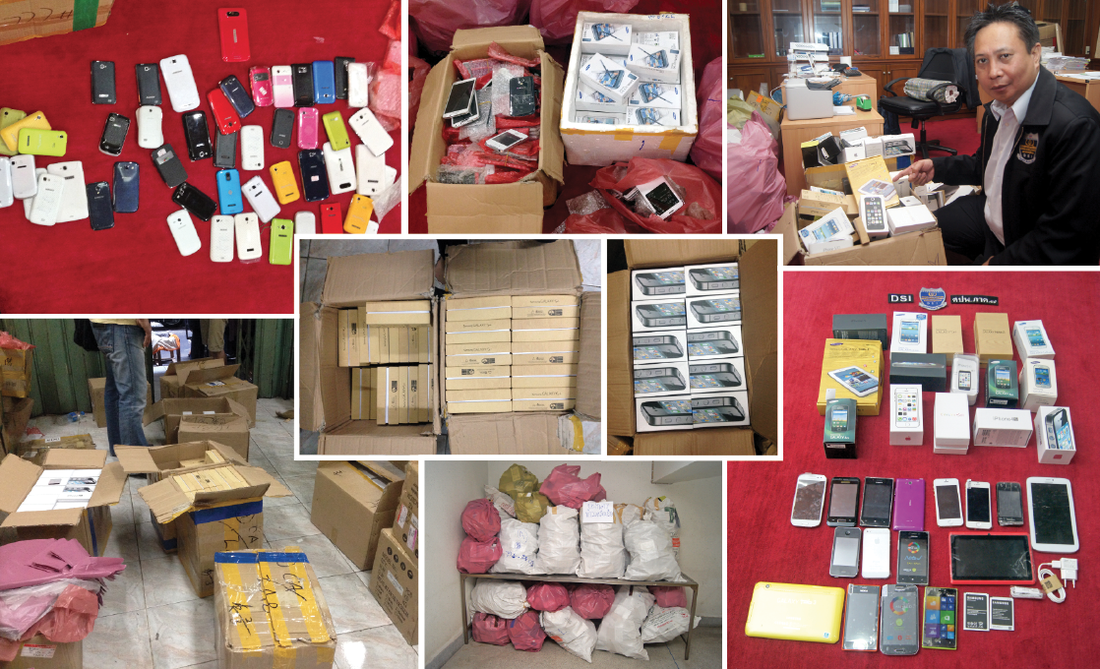
 RSS Feed
RSS Feed
















